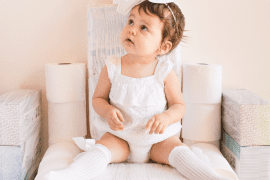For example, when mothers read these books, we found that 39% of babies were placed in their own room to sleep, going against guidance that the safest place is to share a room with their mother. Although thankfully rare, babies who sleep in a different room are at a higher risk of Sudden Infant Death Syndrome (SIDS). This is possibly because parents are unaware of the temperature in that room, or that the baby has become unwell. While sleeping close to their baby can help parents regulate the child’s breathing, temperature and heart rate.
We also found that just 28% of mothers responded immediately if their baby cried at night, with 25.5% leaving a baby to cry themselves to sleep in the evening. Although occasionally leaving a baby to cry briefly is not going to cause harm, consistently leaving a baby to cry can increase the level of stress hormones circulating in a baby’s body, which could potentially programme their system to be overstimulated.
Breastfeeding rates were also lower, both in terms of starting and continuing breastfeeding. Breastfeeding protects maternal and infant health and stopping breastfeeding before mothers are ready is associated with an increased risk of depression. The guidance in these books sets women up to not be able to breastfeed.
Breastfeeding works best when babies are kept close and fed responsively whenever they want to. However, we found that mothers following the book guidance were more likely to try to feed to a mother-led routine, and as noted their babies were sleeping separately at night.
Of course, all this this might just be correlation – mothers who want to parent in this way may be more drawn to the books in the first place, rather than the books affecting their decisions. But we also asked mothers whether the books directly affected their behaviour in any way. Our findings showed that reading the books persuaded mothers to use a sleep and feeding routine (45%), sleep separately to their baby (23%), delay how quickly they responded to their baby’s cry (24%) and cuddle their baby less (15%).
Some advice books can promise a utopia to new parents desperate for a solution to a baby with frequent needs but such strict routines and separation behaviour often do not work and can place babies at increased risk of SIDS. We also know the importance of loving, responsive parenting interactions in the early years for longer term social, emotional and health outcomes – which some books appear to promote the antithesis of.
Although some parents may make an informed decision to follow such advice, for many this guidance doesn’t work, leaving mothers feeling even more stressed. Rather than selling new parents a promise that they can “control” their baby, we need to focus on helping fewer new families feel under such stress and anxiety in the first place.
Amy Brown, Professor of Child Public Health, Swansea University and Victoria Harries, PhD Researcher in Biological Anthropology, Yale University
This article is republished from The Conversation under a Creative Commons license. Read the original article.










